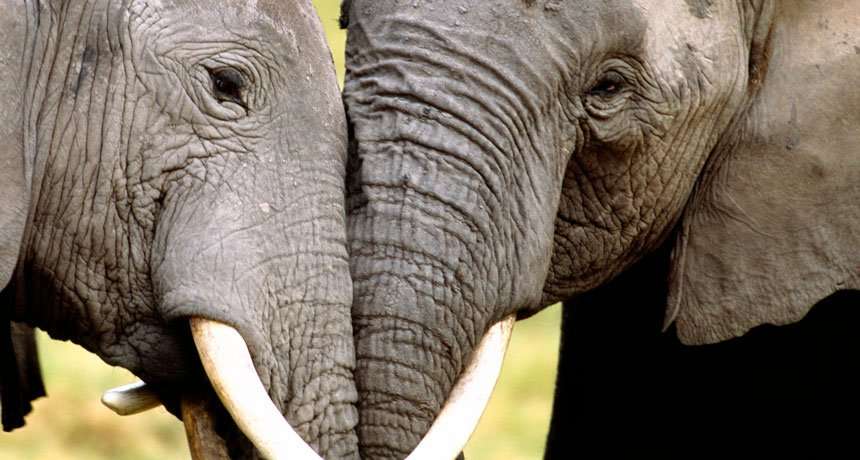Pairs of elephant tusks that are separated during smuggling are illuminating the tracks of wildlife crime.
Identifying matching elephant DNA in different shipments of tusks can help scientific sleuths connect the shipments to the same ivory trafficking cartel, a new study finds. That technique has already revealed the presence of three major interconnected cartels that are active in Africa, researchers report September 19 in Science Advances.
The method could give law enforcement officials more ammunition in prosecuting traffickers and others involved in killing protected wildlife, says study coauthor Samuel Wasser, a conservation biologist at the University of Washington in Seattle.
Elephant poachers kill as many as 40,000 elephants each year as part of an international, illicit ivory industry worth billions. Poachers sell to a pyramid of traffickers, who consolidate ivory from a tangled web of sources and smuggle shipments around the world.
But when traffickers are nabbed, they’re usually busted only for the ivory they’re caught smuggling. Being able to tie them to other poaching and trafficking events could up the penalties the criminals face, and help law enforcement bring down more people who tie operations together, Wasser says.
Previously, he and colleagues have used DNA found in elephant tusks and poop to link trafficked tusks to specific poaching hotspots in central and southeastern Africa (SN: 7/25/15, p. 9). While sampling confiscated ivory, his team noticed that tusks from the same animal often ended up in different shipments, linking those containers to the same people.
In the new study, Wasser’s team sampled DNA from tusks from 38 large seizures of ivory and hunted for genetically identical tusks within that pool. Among 11 of the seizures, all made from December 2011 to May 2014, the team found a number of links — for example, two shipments containing genetically matched tusks that were seized from the same port within a short time of one another. Some shipments contained genetic matches to multiple others. Collectively, those connections indicate the presence of three big cartels in Africa, which sometimes work together, Wasser says.
“The connection between multiple seizures gives us a lot more evidence to look at and data to mine as far as the financial connections and the financial transactions that took place to facilitate these illegal shipments,” Homeland Security special agent John Brown said in a news conference on September 18.

kencrypted on September 23rd, 2018 at 09:50 UTC »
good now we just have to detained those guys and make them pay for their transgressions
LinoVentura66 on September 23rd, 2018 at 07:07 UTC »
I’m all for the death penalty for poachers of endangered species and/or feed them to the wild animals. Furthermore harsh prison sentences for any other person caught with parts of the animals.
XFidelacchiusX on September 23rd, 2018 at 06:49 UTC »
I'm not a recycling/save the ice caps/hug a tree type of person. But they need make an example of these people.
I could almost understand killing an animal to eat/use it. But they shoot the things take the tusk and leave the rest of the elephant there. Its wasteful and disturbing. Murder for greed.